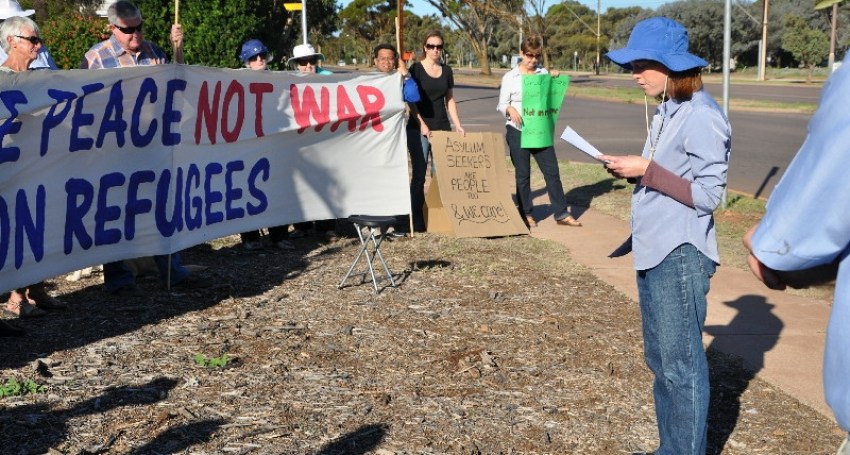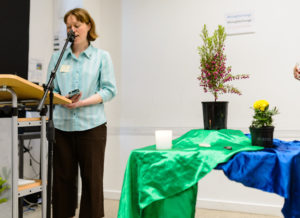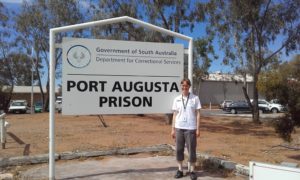Serving those on the margins
People
Whether it’s walking alongside men and women in prisons or detention centres or providing pastoral care and support to young or old, the call to serve those on the peripheries is at the heart of Sr Elizabeth Young's ministry. Emerging from this work is a vision for the Catholic Church in Australia to explore, discuss and discern the diaconate, including the reinstatement of women as deacons. It’s a conversation that she hopes will be led and guided by the Holy Spirit.

Elizabeth Young RSM felt the call to permanent ordained ministry when she was seven years old.
It was a call that persistently recurred in her life thereafter, and which saw her become a Catholic during her primary school years. She’d grown up in a Protestant family on Boandik country in South Australia and was sent to the Catholic primary school in Penola established by St Mary of the Cross MacKillop in 1866. In Grade 2 she received the sacraments of First Reconciliation and First Communion and became Catholic. Her mother and siblings soon followed.
Advertisement
“As a family, we all went to the Uniting Church together, and we were very involved,” Elizabeth said. “Dad was a lay preacher; mum ran the Sunday School and we loved going to church – it was a big part of our life.
“I really felt attracted to the Catholic Church. I loved the sacramentality, and I loved the saints, I just felt at home in the Catholic Church. I did appreciate the church I’d grown up in, but the Catholic Church became who I was.”
Over the years, following the call in her heart to give her life in service to those in need, Elizabeth became a Sister of Mercy and undertook her final profession in 2016. She has studied an undergraduate degree in Circus Arts at Swinburne University in Melbourne, a Bachelor of Theology at Flinders University in Adelaide, a Graduate Diploma of Teaching and Learning at Charles Darwin University and completed her Master of Theology (Coursework) at the University of Divinity in Melbourne.
Over the years, Elizabeth has spent much time and energy in ministry on the margins, and it’s where she feels most deeply called. She was in the Catholic Diocese of Port Pirie for six years, which included coordinating the youth and young adult ministry, as well as taking on a chaplaincy role in the prison in Port Augusta and detention centres. During holiday periods, she was chaplain at Curtin Detention Centre in Western Australia.
She has worked as a pastoral associate at All Saints Parish in Fitzroy, Victoria, where she served people from the housing trust flats, and newly arrived peoples. She also volunteered at Port Phillip Prison, a maximum-security prison in Melbourne one day a week, which she “loved”. She’s currently in the Catholic Diocese of Wilcannia-Forbes where she is serving as a pastoral worker and chaplain to the local secondary college.

Leading a prayer at an interfaith environmental gathering.
“I am involved in a very wide variety of different ministries and roles, and the only way you can really describe it altogether is ‘like a deacon’,” said Elizabeth. “What I do is like the work of a deacon, but without the ordination.”
It was this “call to diaconal ministry” that saw Elizabeth create a website in October 2021, Liturgy on the Margins, to participate in a nationwide movement in the hope of generating ‘conversation, prayer and discernment’. Before the website was launched, an interested group of people had formed to share this initiative, under the name of ‘Australian Catholics Exploring the Diaconate’. Since then, Elizabeth has been listening to the stories of many people engaged in diaconal ministry – deacons, priests, pastoral workers, chaplains, and Sisters. A few, like her, feel called to have this ministry authorised in a more permanent way.
Advertisement
“I think that we can have this conversation together with the institutional Church, with the people in the pews, with the people who are on the margins, the current permanent deacons and others doing these ministries,” said Elizabeth. “It’s a conversation that can include everyone; everyone can consider and pray about this at a national level, but of course these sorts of things have to be discerned at the Vatican level, too.”
Elizabeth is very specific about not confusing the conversation about the reinstatement of women in the diaconate with the role of priesthood. That is not the case.
“Pope John Paul II and Benedict XVI opened a possibility for the reinstatement of women in the diaconate by their change in the Canon Law, which made quite a clear distinction between the priesthood and the diaconate,” explained Elizabeth. “They’re quite different and we are just focusing on the diaconate.
“And for me, the focus is not on women and what they can and can’t do, rather, the focus is on the people on the margins and specifically, the liturgical needs of those people. Anyone can offer pastoral care – that’s not an issue – but the issue is how we can serve people in liturgy and sacrament, which is such a special and different aspect of God’s mission that is offered.
“As Catholics, we believe in the sacraments and in the power of the liturgy and how important that is to our faith. There are people, particularly in rural and remote areas, in prison and detention, and many other settings, that are in need of liturgical ministry, and their needs are not being addressed. And yet, there are people willing and able to address them.
“And it’s not about changing what we’re doing or taking anyone’s jobs at all. It’s about recognising that the Spirit is calling people to this as a vocation and that it’s an option for young people as a permanent calling. I think that’s an important thing – it’s really about the future generations and it’s about those on the margins who are not being served.”
Elizabeth has had the “great privilege and joy” to serve liturgically in prison, parish and school settings. She received training in the Liturgy of the Word with Holy Communion to lead, with the approval of the bishop or archbishop, on those occasions when a priest could not be present.
In her years of prison ministry, there were several times when the men and women residing in prison requested that liturgical prayer be available.
“God works through the liturgy in a different way than just sitting down and having a chat one-on-one, or even in a group,” said Elizabeth.
“I used the approved Communion Rite to share Christ’s body with people who were so deprived of intimacy and comfort.”
On one particularly moving occasion during the liturgy, “there was an opportunity for grief to be expressed, to be worked through, to enable a connection with God and with each other. It was very moving and touching, both for the people who were there and also for me, and the other chaplain who was present as well”.
“In many experiences like this one, I have felt that I am exactly in the right place – I’m where I’m meant to be,” she said. “I sensed God smiling on all of us. I do not think that I am alone. It is a diaconal call, a call to liturgy on the margins – a call that I hope our Church will recognise and promote for people like me.”
She added, “Those liturgical moments, those celebrations with people in the tiniest little churches, in the schools, in the prisons, in the detention centres fill me with joy. Those times give me hope and talking to the people involved, it’s really special for all of us. It changes something in our lives; it moves from the everyday into that realm of liturgy where magic can happen, and then we go back and are strengthened. I feel God’s really with us all, and our faith comes alive.”
Elizabeth is inspired by the example of Jesus who “called us to witness to the reign of God in the world. He went out to the margins, and he included and empowered people, often the least likely people, to lead. In the early Christian Church, ministries were taken on by women, by fishermen, by people that weren’t the expected religious leaders”.
“There was this whole vision of the reign of God, in which young and old, women and men, would be proclaiming God’s love to the world. That’s who we are as Christians,” she said.

Outside the Port Augusta Prison.
As the international Catholic Church embarks on the Synod of Synodality in 2023, Elizabeth is hopeful that the conversation to restore women to the diaconate can be reignited. Just as the Holy Spirit led those present at Vatican II to reintroduce male permanent deacons, she hopes the Holy Spirit will again lead to this “simple change”.
“I think the vision of the deacon is to be of service to those places that are in greater need or have missed out, as identified by the bishop. There are people willing and able to address them. We need to be creative and to find ways to serve and minister, but we need that commissioning by the Church to do so properly.
“This has been a long journey of prayer and discernment, over many years, and I feel that the Holy Spirit has been working in this whole journey. And while myself and the Sisters might have had other plans for my life, it just keeps coming back to that pastoral and liturgical ministry on the margins.”
Join the conversation and find out more about upcoming talks and webinars by contacting Elizabeth Young RSM through Liturgy on the Margins.







Comments
Show comments Hide comments